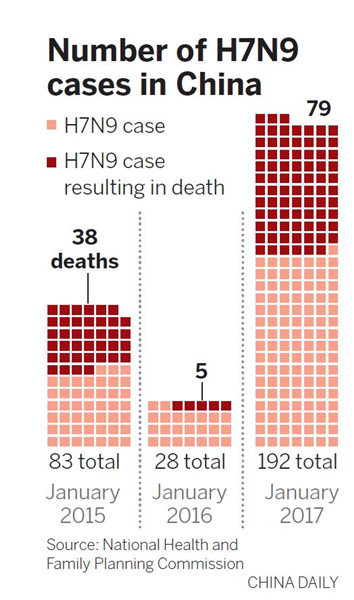H7N9 bird flu season past its peak

China’s worst H7N9 bird flu season appears to have passed its peak but still is expected to last into late April, according to the latest information from epidemiologists.
Ni Daxin, deputy director of emergency response for the Chinese Center for Disease Control and Prevention, said on Wednesday that the H7N9 epidemic appears to have been contained because fewer new cases are being reported daily.
“The peak of the epidemic seems to have passed, but smaller outbreaks may last into late April,” he said at a news conference held by the National Health and Family Planning Commission.
He called for strengthening measures to control the virus, in particular shutting down additional live poultry markets.
In January alone, the Chinese mainland reported 192 human cases of H7N9, including 79 deaths, making it the worst season since the virus first appeared in the country in 2013, according to the commission.
The situation has rekindled public concern about potential viral mutations that could facilitate human-to-human transmission and an H7N9 pandemic.
Shu Yuelong, head of the Chinese National Influenza Center, said the virus has so far shown no mutations that would enable a sustained human spread.
However, he said that there have been four family clusters reported since September, and two may have involved human-to-human transmission via close contact.
Each of the two clusters involved two family members, with the first patient contracting the virus through exposure to live poultry in both cases, Shu said, without providing more details.
“These were highly individual, and all other patients were infected through contact with infected live poultry or wild birds,” he stressed.
China has a national, real-time viral surveillance network and a joint epidemic control force involving several departments covering areas such as agriculture and commerce, according to a division director with the health commission who declined to be named.
“This collaboration is crucial to fighting viruses like H7N9, which can infect birds and humans,” he said. Information exchanges helped agricultural authorities determine that H7N9 contamination is concentrated at live poultry markets, not at chicken farms.
In the hardest-hit regions, almost half of the remaining live poultry markets were found to have H7N9 contamination, he said.
During this H7N9 bird flu season, which started in October, the virus had infected 306 people and by the end of January had killed 100 in 16 provinces, including Guangdong, Jiangsu and Anhui.
Most cases happened in the south and on the eastern seaboard, Ni said, adding that the main reasons were weather conditions and “the local habits of buying live or freshly slaughtered chickens”.
In response, regions have shut down live poultry trading and markets as part of effort to contain the outbreak.
But that is only a short-term, emergency measure, Ni said. “The ultimate way out is to upgrade the industry, shifting to large-scale poultry farming and slaughtering.”
The closing of live poultry markets has proved effective in slowing the spread of the virus, he said, adding that the public can also help by avoiding live poultry markets or handling live poultry or their droppings.
“If the public buys only frozen poultry, control of the epidemic will be much easier. The nutritional value is equal to that of freshly slaughtered poultry, but it involves far fewer health risks,” Ni added.